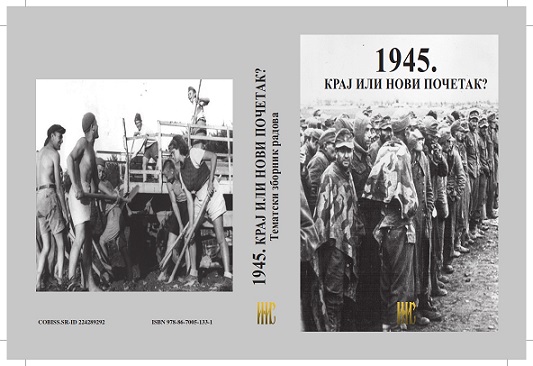Problemi opskrbe, krijumčarenje i borba protiv gospodarskog kriminala u hrvatskome dijelu Zone B Julijske krajine (1945-1947)
Provisioning Problem and Struggle against Economic Crime in the Croatian Part of the Zone B of Venezia Giulia (1945-1947)
Author(s): Vedran Dukovski
Subject(s): Economic history, International relations/trade, Criminology, Economic development, WW II and following years (1940 - 1949), Post-War period (1950 - 1989)
Published by: Institut za noviju istoriju Srbije
Keywords: History of Istria 1945-1957; trade; smuggling; black market;
Summary/Abstract: Territorial division of Istria, occupation on the part of the Yugoslav Army and the Allied forces, i.e., the unsolved political and legal status of Istria played a crucial role in renewal of provisioning and commerce, but also in the development of smuggling and gray market. Ideological indoctrination of the authorities that did not allow development of private ownership and "enrichment” (that were against the laws of free market) caused slow resumption of trade and provisioning, but also booming of economic crime. Constant lack of foodstuffs and other goods was made worse by incapable and unskilled cadres of district authorities who usually got their posts thanks to their "achievements” and not according to competence. Unsuccessful implementation of plans for restoration of economy, but also of provisioning and commerce, can be attributed to political indoctrination of individuals. The conflict between district People’s Committees and County People’s Committee for Istria was also in evidence. It aggravated the situation since the district People’s Committees wanted to establish monopoly on commerce. Fighting over monopoly, the authorities forgot the people who were forced to seek remedy in illegal activities and buying from grasping smugglers. Apart from the rivalry between the People’s Committees, there were military authorities that cooperated poorly or not at all with People’s Committees, so the people were often sandwiched between two authorities each of whom laid their own laws. The main motive of most smugglers was simply survival. Most people going into smuggling had on other choice. In their struggle against smuggling the authorities focused primarily on those who sold for personal gain. These people dealt mostly in rationed monopoly items such as tobacco, spirits and salt, as well as in foreign currency - mostly Italian lire.
Book: 1945. Kpaj или нови почетак?
- Page Range: 449-475
- Page Count: 28
- Publication Year: 2016
- Language: Croatian
- Content File-PDF

